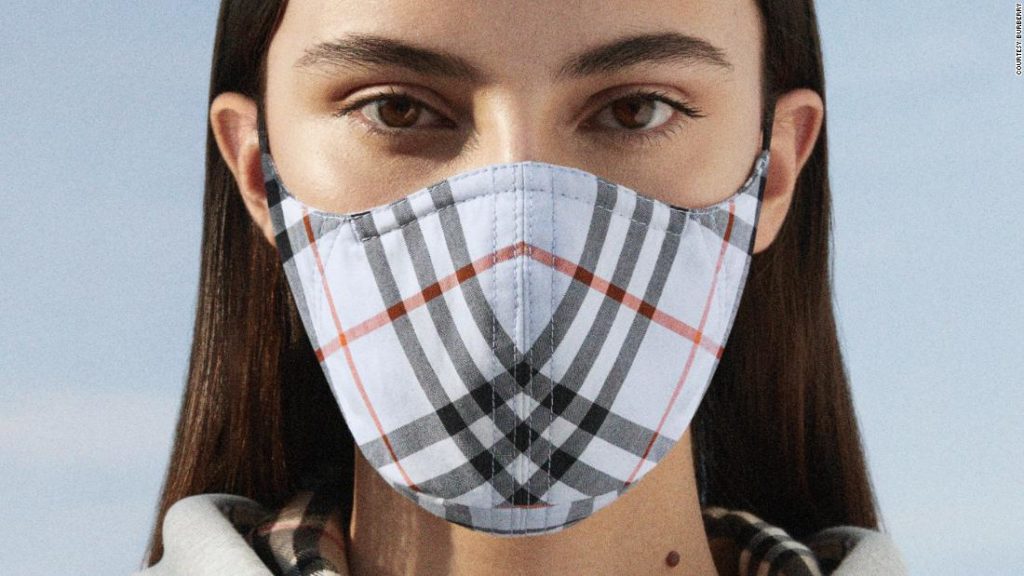
Burberry announced an upcoming line of antimicrobial masks in their signature check textile. Credit: Courtesy Burberry
In recent months, brands including Burberry have introduced masks that, they claim, are protected from microbes and germs. Burberry’s forthcoming beige and blue designs come in the label’s signature check. Under Armour’s multi-layered UA Sportsmask, which is marketed as having antimicrobial properties, sold out in under an hour when it was released this summer.
Without sound scientific testing by brands across the board, it is difficult to assess whether antimicrobial treatments can protect wearers from the novel coronavirus, according to Amy Price, a senior research scientist at Stanford Anesthesia Informatics and Media (AIM) Lab who has advised the WHO on its face mask guidelines.
“The challenge is that sometimes claims are made, but they aren’t tested on the actual masks or with the actual virus,” she said over a video conference call. “So they’re like gimmicks.” Price has not tested any of the products mentioned in this article.
But some others have not revealed which viruses, if any, their products have been tested on, muddying the waters of so-called “antimicrobial” fashion.
Price, who studied the effectiveness of fabric masks alongside AIM Lab’s director, Larry Chu, said there are a number of variables that determine how much protection a product offers.
“Oftentimes, bacteria and viruses have different ways of reproducing, and different things are effective against them,” she explained. “With antimicrobial (treatments) it’s important to know what you’re dealing with, what it’s been tested with and if it’s safe for human skin.
“(With) anything that you put on your face — especially that you’re going to be wearing day in and day out — you want to make sure it is really something that is safe or FDA approved.”
Murky claims
Since the coronavirus outbreak was labeled a pandemic by the WHO in March, the guidance around mask-wearing has continued to evolve. Many countries now require face coverings to be worn in public spaces in order to reduce the spread of the virus.

Cloth face masks have become a popular reusable option during the pandemic. The World Health Organization recommends washing with soap and water in between wears to kill germs. Credit: Alfredo Estrella/AFP/Getty Images
There have been few published studies, so far, examining the impact of antimicrobial and antiviral fabric treatments on the new coronavirus. And there is no single type of technology being used by clothing brands, so each would require extensive individual studies to judge their efficacy. It will be important to consider whether a treated fabric is able to neutralize the virus, and if so, how long it takes (“the virus can get in within nanoseconds,” Price said), as well as the number of washes the antimicrobial treatment can withstand.
Earlier this month, Polygiene, which recently partnered with Diesel and is the maker of ViralOff, said in a press release that the antimicrobial textile treatment technology can successfully kill 99% of SARS-CoV-2 from textile surfaces within two hours. While Price has not tested Polygiene’s ViralOff technology, she believes two hours is “a lengthy disinfection time,” explaining that the garment could contaminate skin, food, water or mucous membranes during that period if it makes contact.
Polygiene describes its textile treatment as “durable,” but advises users to “wash less and only when needed.” Over email, the company clarified that it cannot guarantee ViralOff will continue to work after machine washing — it recommends gently washing garments treated ViralOff by hand or not washing at all — but said that another formula is currently in development.
Under Armour and Diesel did not return CNN’s requests for comment, while Burberry would not elaborate on the type of antimicrobial treatment used in its masks.
Unresolved questions
Both companies say their products have also been tested with other pathogens, including strains of influenza and different types of coronavirus, with each lasting 30 washes, but CNN is unable to independently verify these claims.
Related video: 5 ways you can change your fashion habits to help the planet
“Antiviral fabrics reduce the risk of virus transmission through surface contamination and are added protection from the virus,” said Rahel Kägi Romero, of HeiQ’s marketing team, over email. “HeiQ does not want to make health claims and give people a wrong sense of security. Antiviral fabric is one factor in keeping people safe, but it needs to go hand in hand with other measures, such as keeping a social distance, wearing face masks when in crowded areas and washing hands regularly.”
The possible benefits of antimicrobial fabrics are even less clear for garments that don’t usually come into contact with the face, like jeans, Price said. “Unless you’re going to just be sitting there, rubbing your legs and then rubbing your face, then what’s the point?” she asked. Plus, even if a textile treatment is proven to reduce certain viral activity, that doesn’t necessarily make it practical for all types of garments.
Price doesn’t discount the potential value of antimicrobial textiles, but so far, she said, the studies offer an incomplete picture. “Should this be tested? Yes,” she said. “(But) it should absolutely not be marketed to the public through press releases and industry brochures before the results are vetted and replicated in a fair test of treatments, like a well-run randomized clinical trial.
“Even FDA trials contain three phases and aftermarket surveillance… If a person feels safer wearing a microbial textile, and this safety is only a marketing illusion, it could cost them their lives or their health.”
You may also like
-
Afghanistan: Civilian casualties hit record high amid US withdrawal, UN says
-
How Taiwan is trying to defend against a cyber ‘World War III’
-
Pandemic travel news this week: Quarantine escapes and airplane disguises
-
Why would anyone trust Brexit Britain again?
-
Black fungus: A second crisis is killing survivors of India’s worst Covid wave

